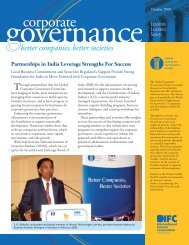Overview of Corporate Governance Issues for Co-operatives - IFC
Overview of Corporate Governance Issues for Co-operatives - IFC
Overview of Corporate Governance Issues for Co-operatives - IFC
Create successful ePaper yourself
Turn your PDF publications into a flip-book with our unique Google optimized e-Paper software.
Many studies draw primarily on US examples but some do consider evidence fromco-<strong>operatives</strong> based in different sectors (e.g., agricultural, consumers, housing).Hansmann, <strong>for</strong> example, contends that the costs <strong>of</strong> sustaining <strong>for</strong>ms <strong>of</strong> economicdemocracy become too high where there is a lack <strong>of</strong> homogeneity and conflictinginterests among the owner members. This is reflected in the relative rarity <strong>of</strong> memberownedbusinesses within the private sector. Where member-owned enterprises aresmaller and have more homogenous membership, they can and do survive asevidenced by the presence <strong>of</strong> co-<strong>operatives</strong> in agricultural marketing, rural utilities andhousing (Hansmann 1996).This study is based on case studies derived solely from the USA and does not includethe large consumer, worker and agricultural co-<strong>operatives</strong> that can be found in Europe.Dow, however, does consider European case studies and identifies a range <strong>of</strong> factorsthat contribute to the relative rarity <strong>of</strong> member owned businesses. He emphasises theimportance <strong>of</strong> exploring the historical context and the ways in which legal institutionsand codes have ensured the dominance <strong>of</strong> investor-owned firms and restricted thedevelopment <strong>of</strong> other models. <strong>Co</strong>-<strong>operatives</strong> need a supportive policy framework to besustainable. This support has been enjoyed by Legacoop in Italy where an enablinglegislative and financial framework has helped to create a large and vibrant co-<strong>operatives</strong>ector. He comments that the “Lega experience also refutes the idea that such firmssuffer from deep organizational flaws that predispose them to failure” (Dow 2003:75).Cuevas and Fischer identify the principal source <strong>of</strong> failure <strong>for</strong> CFIs as deriving frommember/owner conflict with management. The growth <strong>of</strong> a co-operative inevitablyexpands (or dilutes) ownership and managers become subject to weaker controls. Thisresults in rent-seeking behaviour and wasteful expenses. This tendency is rein<strong>for</strong>ced bythe fact that co-<strong>operatives</strong> have frequently faced weak external competition throughsubsidised financing from government which has also enabled inefficient managers tosurvive (Cuevas and Fischer 2006).The development <strong>of</strong> managerial dominance within co-<strong>operatives</strong> has been a strongtheme within the literature on non-financial co-<strong>operatives</strong> as well. An influential modelhas linked co-<strong>operatives</strong> to a process <strong>of</strong> democratic degeneration. Meister, <strong>for</strong> example,identified four stages in the internal trans<strong>for</strong>mation <strong>of</strong> democratic organisations intomanager-led enterprises. This relates to the growth in size and complexity <strong>of</strong> theenterprise which enables management to take advantage <strong>of</strong> growing member apathyand distance from the original core co-operative values (Meister 1984).Another recent study has proposed a model <strong>of</strong> five management and governance roleswithin co-<strong>operatives</strong>. It also links the tendency <strong>for</strong> the diminishing role <strong>of</strong> membership ingovernance to the expansion <strong>of</strong> the co-operative and a growing domination <strong>of</strong>commercial values fostered by a pr<strong>of</strong>essional management distanced from co-operativevalues (Malo and Vezina 2004).Page 12


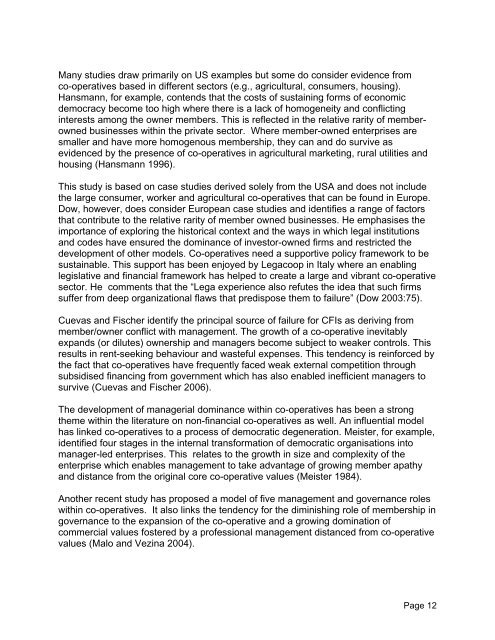
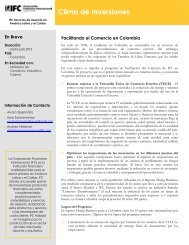
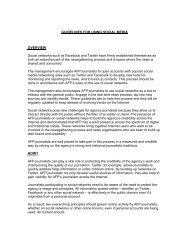
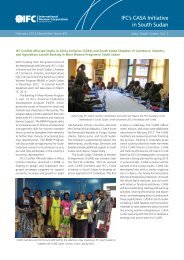
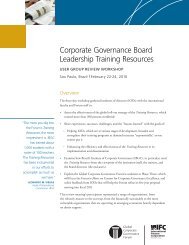

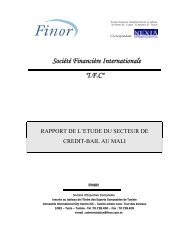


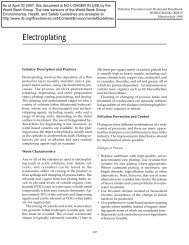

![Print a two-page fact sheet on this project [PDF] - IFC](https://img.yumpu.com/43449799/1/190x245/print-a-two-page-fact-sheet-on-this-project-pdf-ifc.jpg?quality=85)

